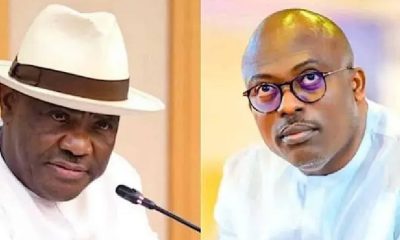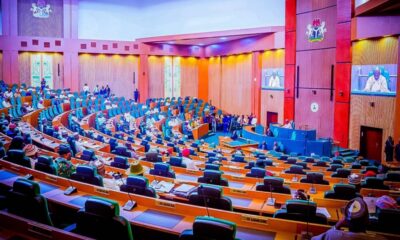Economy
Ways & Means hike: CBN may loan over N746bn to FG

The Central Bank of Nigeria may print or wire over N746bn as a loan to the Federal Government based on the Ways and Means provision of the CBN Act.
In the Act, funds that the apex bank should provide to the Federal Government through Ways and Means is five per cent of the Federal Government’s previous year’s revenue.
Last week, the National Assembly raised the maximum borrowing percentage in the Act from five per cent to ten per cent.
Data from the National Bureau of Statistics on Saturday indicated that as of the third quarter of 2023, the Federal Government’s actual aggregate revenue was N7.46tn.
Based on the hike in Ways and Means funding approved by the National Assembly, the Federal Government would get no less than N746bn from the apex bank through the funding scheme.
The Ways and Means Advances are loan facilities used by the CBN to finance the government during periods of temporary budget shortfalls and are subject to limits imposed by law.
According to Section 38 of the CBN Act, 2007, the apex bank may grant temporary advances to the Federal Government with regards to temporary deficiency of budget revenue at such rate of interest as the bank may determine.
The Act read in part, “The total amount of such advances outstanding shall not at any time exceed five per cent of the previous year’s actual revenue of the Federal Government.”
The maximum borrowing percentage in the Act was hiked from five per cent to ten per cent by lawmakers last week, as they also rescinded and re-enacted the 2024 Appropriation Act through an amendment bill sponsored by leaders of both chambers.
In the Senate, the increase in the threshold was achieved through the consideration and passage of a bill sponsored by its Leader, Senator Opeyemi Bamidele (APC Ekiti Central).
In his lead debate, Senator Bamidele explained that the bill seeks to amend the CBN Act to increase the total CBN advances to the Federal Government.
He stated that the bill aims to help the government meet its immediate and future obligations due to the increasing need for funds to finance budget deficits and other expenses.
“The Central Bank of Nigeria’s advances to the Federal Government are essentially loans that the Central Bank of Nigeria provides to the government to help it meet its financial obligations. These advances are typically short-term and are expected to be repaid by the government,” he said.
Senator Bamidele explained that the request to increase the threshold from five per cent to fifteen per cent of the previous year’s revenue was made to provide immediate funds to address budget shortfalls, finance essential government expenditures, maintain financial market stability, inject money into the economy, and support critical sectors like agriculture, healthcare, and infrastructure development.
He said this would also lower government borrowing costs compared to traditional borrowing methods.
During the debate, many Senators supported the amendment but argued that the 15 per cent should be reduced to ten per cent.
However, the Federal Government had in the past taken excessive advantage of Ways and Means loans.
The administration of former President, Major General Muhammadu Buhari (retd.), had come under heavy criticism for abusing the Ways and Means.
From 2014 to 2023, the Federal Government collected N30tn through Ways and Means from the CBN without National Assembly appropriation.
Following this, the Senate set up an Ad-hoc committee led by Senator Isah Jibrin (APC, Kogi East), to carry out investigations.
Commenting on the development, financial analysts said the CBN would have to print more cash to meet the demands for increased funds through the Ways and Means advances, pointing out that this could further raise inflation.
An economist, Paul Alaje, expressed concern over the increase in Ways and Means advances to the Federal Government from five to ten per cent.
He said the move would lead to increased pressure on the CBN to print more money, potentially affecting the economy adversely.
Another economist at Lotus Beta Analytics, Shadrach Israel, also expressed concern over the recent increase, noting that it could lead to an increase in money supply and, subsequently, inflation.
He, however, acknowledged that the current upward trend in interest rates might mitigate the effects of the increase.
Recall that the Minister of Finance and Coordinating Minister of Economy, Wale Edun, said the N22.7tn printed by the CBN through Ways and Means overdraft for the Federal Government from 2015 to 2023, under former President Buhari, threw the country into the current inflation.
Economy
75.5% of rural Nigerians now live below poverty line — World Bank

The World Bank has disclosed that a staggering 75.5 per cent of rural Nigerians are now living below the poverty line, reflecting deepening hardship in the country’s hinterlands.
This was revealed in the Bank’s April 2025 Poverty and Equity Brief for Nigeria, which paints a grim picture of worsening economic hardship, widening inequality, and persistent underdevelopment across much of the nation.
While poverty is widespread among urban populations, the report emphasised that the situation is significantly worse in rural areas, where economic stagnation, high inflation, and insecurity have exacerbated living conditions.
“Based on the most recent official household survey data from Nigeria’s National Bureau of Statistics, 30.9 per cent of Nigerians lived below the international extreme poverty line of $2.15 per person per day in 2018/19 before the COVID-19 pandemic,” the report stated.
The report also highlighted Nigeria’s enduring regional disparities. “Nigeria remains spatially unequal. The poverty rate in northern geopolitical zones was 46.5 per cent in 2018/19, compared with 13.5 per cent for southern ones. Inequality measured by the Gini index was estimated at 35.1 in 2018/19.
“Nigeria’s Prosperity Gap — the average factor by which individuals’ incomes must be multiplied to attain a prosperity standard of $25 per day for all — is estimated at 10.2, higher than most peers.”
Despite successive policy interventions, these figures underscore a persistent economic divide across the country.
The report’s demographic analysis found that children aged 0 to 14 years had a poverty rate of 72.5 per cent, reflecting the scale of deprivation among the youngest segment of the population.
Gender disparities were also observed, with 63.9 per cent of females and 63.1 per cent of males classified as poor under the $3.65 per day lower-middle-income threshold.
Education emerged as a significant determinant of poverty, with Nigerians lacking formal education experiencing a poverty rate of 79.5 per cent. This contrasts with 61.9 per cent for those with primary education and 50.0 per cent for secondary school graduates. Only 25.4 per cent of those with tertiary education were considered poor.
The report also drew attention to multidimensional poverty indicators, which further reflect widespread deprivation.
According to the World Bank, about 30.9 per cent of Nigerians live on less than $2.15 daily, 32.6 per cent lack access to limited-standard drinking water, 45.1 per cent do not have limited-standard sanitation, and 39.4 per cent have no electricity.
Education access remains a challenge, with 17.6 per cent of adults yet to complete primary education, and 9.0 per cent of households reporting at least one school-aged child not enrolled in school.
The report noted that even before the COVID-19 pandemic, efforts to reduce extreme poverty had largely stalled.
“Before COVID-19, extreme poverty reduction had almost stagnated, dropping by only half a percentage point annually since 2010. Living standards of the urban poor are hardly improving, and jobs that would allow households to escape poverty are lacking,” the report read.
Although the World Bank acknowledged recent economic reforms aimed at stabilising Nigeria’s macroeconomic outlook, it warned that persistently high inflation continues to undermine household purchasing power, particularly in urban areas where incomes have not kept pace with rising costs.
In light of the worsening situation, the Bank called for urgent policy action to shield vulnerable groups from inflationary shocks and to drive job creation through more productive economic activities.
Economy
Naira Records Marginal Decline Against Dollar at Official Market

The Nigerian naira experienced a mild drop in value on Friday, closing at ₦1,602.18 per dollar in the official foreign exchange market, based on figures released by the Central Bank of Nigeria (CBN).
This marks a decrease of ₦5.49 from the rate of ₦1,596.69 recorded on April 30, the last trading day before the May 1 Workers’ Day holiday—indicating a depreciation of approximately 0.34%.
Earlier in the week, from Monday to Wednesday, the naira remained relatively stable, exchanging at ₦1,599.95, ₦1,599.71, and ₦1,596.69 respectively.
Although the local currency showed some consistency mid-week, it wrapped up the week with a loss, following a sligh dip of 0.02% at the beginning of the week
Economy
Black Market Dollar hits N1,610 Amid Economic quagmire

What is the Dollar to Naira Exchange Rate in the Black Market (Also Known as the Parallel Market or Aboki FX)?
Below is the black market exchange rate for the U.S. dollar to the Nigerian naira as of Thursday, May 1, 2025. These are the typical rates at which you can exchange dollars for naira:
Dollar to Naira Black Market Exchange Rate (May 1, 2025):
At the Lagos Parallel Market, also referred to as the black market, Bureau De Change (BDC) operators are buying dollars at ₦1,602 and selling at ₦1,610, according to market sources.
Please note: The Central Bank of Nigeria (CBN) does not recognize or endorse transactions conducted on the parallel market. The CBN advises individuals and businesses seeking foreign exchange to use official banking channels.
-

 Opinion14 hours ago
Opinion14 hours agoRIVERS, WIKE, FUBARA, AND THE WAY FORWARD
-

 Politics12 hours ago
Politics12 hours agoJust in: Delta PDP Reps members defect to APC
-

 News23 hours ago
News23 hours agoFULL STEPS: How to check 2025 JAMB results
-

 News24 hours ago
News24 hours agoMinistry denies awarding N13bn contracts without due process
-

 News18 hours ago
News18 hours agoVDM may be released on Tuesday
-

 News15 hours ago
News15 hours agoNANS Barricades Lagos-Ibadan Expressway Over Alleged NELFUND Mismanagement
-

 News15 hours ago
News15 hours agoCourt bans Nnamdi Kanu’s in-law from 3 proceedings over live streaming
-

 News11 hours ago
News11 hours agoTension As Lawmakers Warns of Public Revolt Over Insecurity





